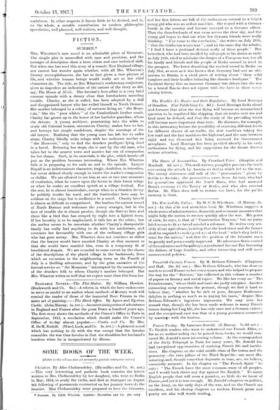FICTION.
SUMMER..
Mts. WrianTox's new novel is en admirable piece of literature. Tho simple plot is unravelled with ease and precision, and the passages of description show a keen vision and rare technical skill. But when one has read this story of a remote New England village. one cannot but wonder again whether, with all Mrs. Wharton's literary accomplishments, she has in fact given a true picture of life, and whether human beings would really act as her chief characters do. The title, as Mrs. Wharton's readers may conjecture, gives as imperfect an indication of the nature of the story as slid, say, The House of .31irt5. The heroine's love-affair is a very brief summer episode with a dreary close that foreshadows unending trouble. Charity, as she is called, has been adopted by a dull and disappointed lawyer who has exiled himself to North Dormer. Her mother belonged to a colony of outcasts living on " the Moun- tain," like the "poor whites" of the Cumborlands further south. Charity has grown up in the house of her bachelor guardian, whom she detests. A young architect, penetrating into the wilds to study old Colonial houses, encounters Charity, makes love to her, and betrays her simple confidence, despite the warnings of the old lawyer. Realizing flint the young man lies left her to suffer alone, Charity blindly seeks refuge with her unknown mother on " the Mountain," only to find the drunken profligate lying dead in a hovel. Retracing her stops, she is met by the old man, who takes her to the nearest town and marries her out of compassion for bor shame. Such, in its essentials, is the plot, which breaks off just as the problem becomes interesting. Where Mrs. Wharton fails is in preparing us for such an end to tho episode. Lawyer Royal! is an indeterminate character, tragic, doubtless, in intention, but never defined clearly enough to excite the reader's compassion or dislike. Wo are allowed to see him at one or two rare moments of exaltations, when he comes upon the lovers in their forest refuge or when be makes an excellent speech at a village festival. For the rest, he is almost inarticulate, except when int a dnunten frenzy be publicly insults his wanl, and the inarticulate hero may be sublime on the stage but is ineffective in a novel. Charity herself is almost as difficult to comprehend, She loathes the narrow round of North Dormer and welcomes the young streamer, but in the face of trouble she is almost passive, though she flutters here and there like a bird that has strayed by night into a lighted room. If her heredity is to be emphasized, it fails her at the crisis ; but the author seems to be uncertain whether Charity's disreputable family has really had anything to do with her misfortune, and contrasts her favourably with one of the ordinary village girls who has gone astray. Mrs. Wharton does net convince us either that the lawyer would have married Charity at that moment or that she would have married him, even in a temporary fit of bewildered despair. We are consoled to some extent by the charm of the descriptions of the placid village in the backwoods, from which an excursion to the neighbouring town on the Fourth of July is a thrilling adventure, and by the grim narrative of the funeral service on " the Mountain " interrupted by the maunderinga of tho drunken folk to whom Charity's mother belonged. But Mrs. Wharton writes so well that we expect more than this from her.


































 Previous page
Previous page